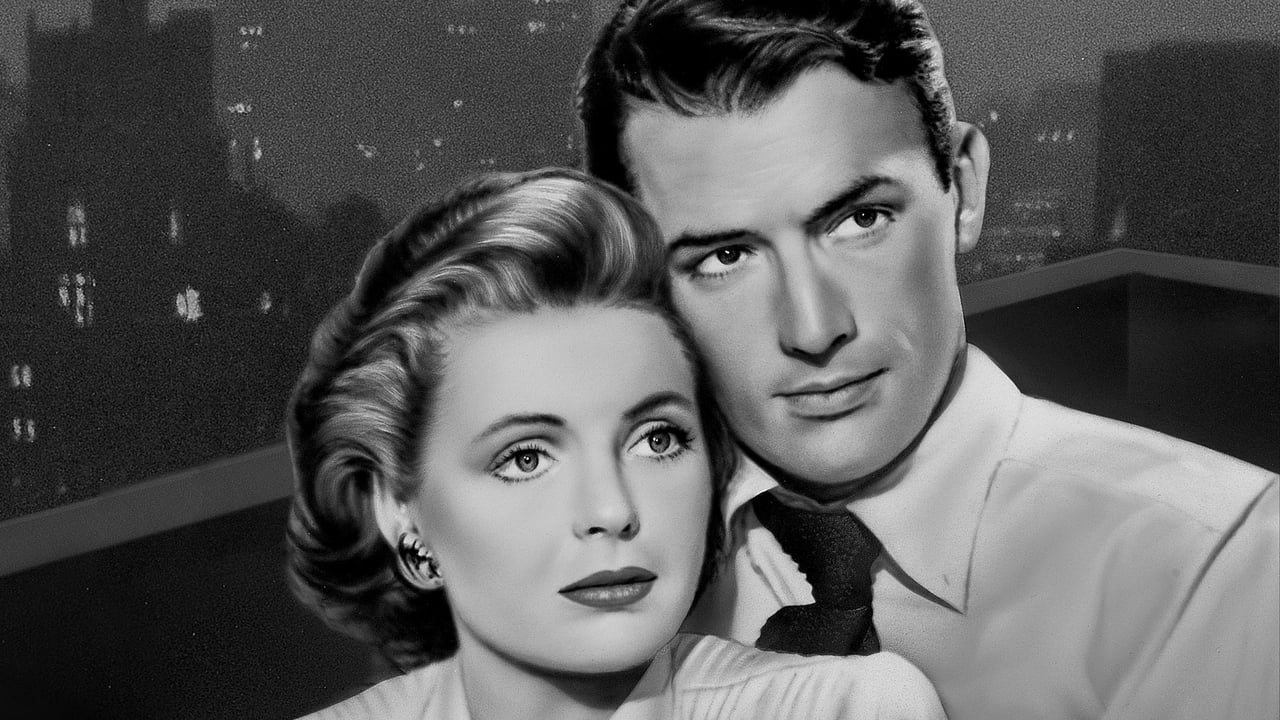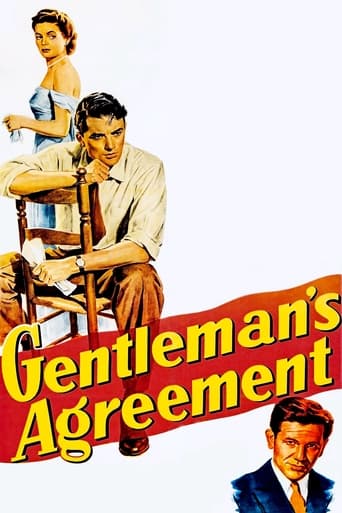

This film was very well done, despite its few shortcomings. Most movies tackling social issues, especially racism, seem to only focus on extreme cases, and I've never seen a movie like this one that explores the small cases that many of us seem to ignore. The whole idea of a "gentleman's agreement" is definitely valid and is still prevalent today, with some people seeming to assume that their supposedly superior ideas are shared by those around them, who are too afraid to correct those who are speaking. The most effective part of this film in terms of its significance was, in my opinion, the depiction of Kathy. As Phil pointed out, there were so many "Kathys," who were apparently upset by racist jokes/comments but did nothing to fight it, just sitting there without saying a word. THIS is the real problem, even today. So many people are surprised and offended by racism and prejudice, questioning why it persists, but do nothing to combat it! Many people watching this film, especially at the time it was released, most likely saw Kathy's change (into someone willing to fight back) and realized their own racist tendencies that they had ignored before, maybe willing to do the same as Kathy with their own lives. A change like this is substantial in that this is how we can truly combat unfortunate things like anti-semitism: fight back. The only criticism I have is that this movie focused only on the upper class, failing to show viewers the issues that were also widespread in every other social class. I think this would have allowed for a bigger picture to be made and a more significant change in the opinions of the audience. Overall, this movie was definitely progressive and eye-opening. Unfortunately, unlike the grandma said, we have not reached a "century for everyone" even to this day, and I doubt we will any time in the near future. However, it is movies like this that push us a little closer and allow us to recognize our own fallacies and delusions. I hope that with more time, we can create a world that is truly void of prejudice and discrimination, not one where people simply think so and ignore their own biases.
... View MoreGregory Peck, the picture of American integrity, takes on the controversial issue of anti-Semitism in the first of his many groundbreaking films, Gentleman's Agreement. In his incredible career, he went on to tackle gambling addiction in The Great Sinner, unhappiness in Suburbia in The Man in the Gray Flannel Suit, and racism in To Kill a Mockingbird. To see a classic "Gregory Peck" role, rent at least one of those four.Greg plays a writer who uncovers the hidden anti-Semitic attitude in the "best areas" of America. He wants to expose this wrong, so he goes undercover as a Jewish man—I know, that sounds dated and offensive, but just give him a chance—and writes about his experiences with prejudice.At a time when America, and Hollywood, tended to sweep all problems under the rug, it was incredible that this movie was even made. Greg lives through some very eye-opening experiences. Friends of his confide in him and share their own anti-Semitic prejudices they've endured, and some aren't as open-minded as they seem to be. Joining the supporting cast are Dorothy Maguire, John Garfield, Ann Revere, Celeste Holm, Sam Jaffe, and Dean Stockwell. If you like movies about social causes or shedding light on the cobwebs in the room, rent Gentleman's Agreement and buckle up for an interesting, dramatic ride.
... View More"I'M not racist, but "Do your eyes roll and fists clench in frustration before the sentence has finished? Fear not - Gentleman's Agreement is on your side. You'd expect a 'Social Problems Picture' dating from the better part of a century ago to play as cornball, and adorably (or troublesomely) antiquated. Instead, it's sobering how, in a contemporary context, Elia Kazan's scrappy interrogation of the deeply harmful societal prejudices imbedded in seemingly innocuous or inconsequential gestures and comments plays as just as poignantly timely as ever. Seventy years on, Gentleman's Agreement has lost none of its robust, fierce urgency, remaining one of the most intelligent conversations on privilege, and how distressing societal imbalances can be carved by those unable to acknowledge it. Many Hollywood films profiling racism dive straight into tackling overt, violent hate crimes. Here, screenwriter Moss Hart, adapting Laura Z Hobson's groundbreaking expose of societal antisemitism, is bold enough to dig one step deeper, into the more subtle, pervasive forms of racial and religious discrimination proliferating in so- called 'polite society' - job hunting, risqué jokes, schoolyard bullying, and general passive- aggressively rude treatment. It's solemn stuff, but Hart's eloquent screenplay, while occasionally toeing the line of excessive 'staginess,' nimbly gets the point across without devolving outright into pedantic preaching. Kazan's direction is just as provocative, framing his film with plentiful New York establishing shots to firmly ground the problem with pervasive antisemitism as a here and now problem, not a distant epidemic easy to wave away. The hook entails Peck's brooding journalist spreading rumours of a falsified Jewish identity in order to 'method write,' believing himself to be better equipped to write about antisemitism when he himself has been subjected to its ugly underbelly. For many, the premise will sound warning bells of a reappropriative, saccharine saviour of the Jewish community, who dabbles in empathy only to shrug off its hardships and cloak himself with his privilege anew upon the closing credits. It's a fair concern, and one, thankfully, that Kazan and Hart anticipate and circumvent, with peppery reminders throughout branding antisemitism, and any other such religious and cultural discrimination, to be everyone's problem, and that those who allow it to subtly fester by allowing dubious comments or actions to pass unchallenged, as just as culpable. In one sardonic instance, a real-life conversation between Jewish industry executives urging the filmmakers to quash the film for fear of 'rocking the boat' makes its way into the script itself, lending it even more power and wry credibility. Occasionally, the film stumbles somewhat over its own noble intentions. To make its point, Peck's compacted experience is a touch clumsily over-exaggerated (though it's a sad realization that this heavy-handedness is ultimately necessary for the message to properly land, whether in 1947 or current day), and there's no denying that a contemporary viewing necessitates suspension of disbelief regarding the more exposition-heavy tropes of the time. Nonetheless, some of Peck's grim, sanctimonious lectures still verge on tiresome 'Mansplaining,' even for the 1940s. Even more curiously but poignantly, Kazan and Hall's reticence in grounding the film in its contemporary cultural context (the script does take pot shots at some of the more outspokenly antisemitic government officials of the time, but abstains from any mention of the Holocaust, or World War II at all, outside of John Garfield's chipper GI) shows how touch-and-go evasion of Hayes Code censorship was. Regardless, Kazan keeps the pace brisk, entwining Peck's experiences of discrimination around a burgeoning romance that, irksomely, might not be as safe from outside microaggressions as he'd hope. Though both he and Kazan have retroactively disparaged his work here as too hesitant, Peck proves an excellent fulcrum for the film's message to roll off. Curbing his legendary dignity and calm with a bristling righteous indignation, Peck's grimness suggests he rankles at the oppression - both that he and his family personally experience, but also in a macro sense - with every fibre of his being. His refusal to let in dregs of his legendary warmth do leave his performance as somewhat wanting in levity, but he's seething and charismatic enough to effortlessly win attention regardless. Similarly, Dorothy McGuire is superb as his impassioned fiancée, and McGuire is wise and skilled enough to remain fundamentally enigmatic, commanding audience sympathy while simultaneously keeping them at arm's length with just enough eyebrow-raising comments to continually postpone a consensus on her character's affability. Finally, John Garfield provides the welcome reprieve of boisterous charisma the film sorely needs, though many of its more unexpected, quietly resonant moments are grounded in watching his face imperceptibly shift to weary resignation coming to terms with the subtle and overt hardships he, as a Jewish citizen is invariably subjected to, war hero status and all. Many will criticize Gentleman's Agreement as being overstated, earnest, or corny in a contemporary environment. Sadly, its message remains as urgently topical as ever in a global climate rife with socio- political intolerance and hatred - both overt, and as knowingly nigh-imperceptible as the film's title. And if a Gregory Peck civil rights double-bill (this and To Kill A Mockingbird, of course) could serve as the cultural balm the world needs, or causes a single viewer to pause and reflect before uttering a politically dubious generalization over dinner, then Gentleman's Agreement is beyond intelligent, eloquent, and piercing: it's borderline essential. -9/10
... View MoreNewly arrived in New York City, journalist widower Gregory Peck (as Philip "Phil" Schuyler Green) takes 11-year-old son Dean Stockwell (as Tommy) to meet grandmother Anne Revere and buy some new shoes. At that age, feet grow quickly. After he is asked to write a series of articles on anti-Semitism, Mr. Peck meets divorced schoolteacher Dorothy McGuire (as Kathy Lacey) at a party. They are mutually attracted. Peck is initially unhappy with his writing assignment, but becomes excited after thinking up a new angle. Peck decides to pretend he is Jewish and write about his personal experiences. "I Was Jewish for Six Months" is the title of Peck's account. Authentically Jewish childhood friend John Garfield (as Dave Goldman) arrives for a visit. As you might expect, Peck encounters prejudice...This famous film about religious bigotry is really a love story, although the backdrop is certainly preeminent. Incidents of anti-Semitism involve young Stockwell being teased on the playground and adult Jews finding upscale areas lack welcome mats. Today, kids are beat up and can sometimes die; around the world, people are shot at Jewish businesses. "Gentleman's Agreement" sticks mainly to cocktail hour inequities. Multiple award-winning director Elia Kazan and Peck take it slow. Additional award winners include supporting actress Celeste Holm (as Anne Dettrey) and juvenile actor Stockwell. Often, it seems like characters are lecturing the audience and retelling unseen incidents; to be more effective, cinema should show more and tell less. Still, it's a good production and nicely performed.****** Gentleman's Agreement (11/11/47) Elia Kazan ~ Gregory Peck, Dorothy McGuire, John Garfield, Celeste Holm
... View More